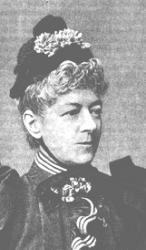
1851 - 1929 Person Name: M. W. Stryker, D.D. Author of "Sing, ev'ry boy and maiden" in The Sunday School Hymnary Stryker, Melancthon Woolsey, D.D., son of the Rev. Isaac Pierson Stryker, was born at Vernon, New York, Jan. 7, 1851, and educated at Hamilton College (1872) and Auburn Theological Seminary (1876). In 1876 he entered the Presbyterian ministry as Pastor at Auburn, New York. In 1878 he removed to Ithaca, N. Y.; in 1883 to Holyoke, Massachusetts, and in 1885 to Chicago, Illinois. He received his degree of D.D. from Hamilton College in 1889. He has edited Christian Chorals, 1885 ; New Alleluia, 1880-86; and Church Song, 1889. He was also joint editor with H. P. Main of The Church Praise Book, 1882. He has also published Hymns and Verses, 1883, and Song of Miriam, and Other Hymns and Verses,
1888. To two of these works which have been designed for daily use in divine worship Dr. Stryker contributed the following original hymns:—
i. The Church Praise Book, 1882.
1. Burst forth, 0 Bridegroom, from Thy chamber bright. Second Advent Desired. (1880.)
2. Death cannot make my soul afraid. Death Contemplated. (1881.)
3. Eternal day hath dawned. Heaven. (1881.)
4. Mighty God, Thy Church recover. Missions. (1881.)
5. King again, ye starry chime. Christmas. (1881.)
6. Sing, Israel, for the Lord your strength. Passing the Red Sea. (1878.)
7. The tribes of faith from all the earth. Heaven. (1881.)
8. Thy Kingdom come, 0 blessed Son of God. Second Advent Desired, (1880.) Re-written in Church Song, 1889, as "Thy Kingdom come, 0 everlasting Lord."
9. When the everlasting Lord. Morning. (1880.)
ii. Church Song, 1889.
10. Arouse Thy Church, Almighty God. Missions. (1887.)
11. Father, as here we bow. Holy Trinity. (1886.)
12. Four hundred years their course have sped. American National Hymn. (1888.)
13. God of our Fathers, our God to-day. National Hymn. (1889.)
14. Lo, where that spotless Lamb for sin provided. Passiontide. (1884.)
15. My Maker, at Thy holy throne. Holy Baptism. (1888.)
16. O God, Thy judgments give the King, Thy Son. Missions. (1883.)
17. O Thou, Eternal, Changeless, Infinite. Praise to God. (1882.)
18. 0 Thou, Omnipresent. Omnipresence of the Father. (1885.)
19. O Thou Shepherd of Thine Israel, hear us. Ps. lxxz. (1883.)
20. Our God, and our Redeemer. Opening of a Place of Worship. (1883.)
21. Robbed, bruised, and dying, once I lay. The Good Samaritan. (1886.)
22. Sing, every boy and maiden. Praise to God. (1885.)
23. Thou, Lord of my life, by the words Thou hast said. Lent. (1887.)
24. Thy grace is all of grace. Divine Grace. (1886.)
25. To Thee, our God, these babes we bring. Holy Baptism. (1886.)
26. Tranquilly, slowly, solemnly, lowly. Burial. (1884.)
27. We close Thy blessed Word. Sunday Evening. (1S87.)
28. While all the night-stars fade and wane. Easter. (1884.)
In addition to these original hymns Dr. Stryker has several translations from the German which are in common use. One of his hymns, No. 513, "Now I lay me down to sleep" (Child's Evening hymn), in Church Song, 1889 (dated 1884), begins with a stanza by another hand. In the same work there are also several of his tunes. Dr. Stryker's hymns are massive and rugged, full of dogmatism and fire, but they lack unity and purity of rhythm. In some instances words stand for thoughts, and exclamations for ideas. Nevertheless a few will live.
-- John Julian, Dictionary of Hymnology (1907)
=================
Stryker, M. W., pp. 1098, i.; 1525, ii. 7; 1615, iv. In 1892, Dr. Stryker became Presi¬dent of Hamilton College and also received the LL.D. from Lafayette College. His College Hymnal, 1897, 1904, contains 28 of his hymns, the majority of which date 1890-1894. Of these "From doubt and all its sullen pain" (Faith), written in 1890, is found in other collections. Dr. Stryker d. in 1905. His Dies Irae was published 1892, and his Latermath (verse) 1896.
--John Julian, Dictionary of Hymnology, New Supplement (1907)
Melancthon Woolsey Stryker

